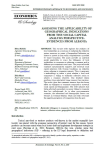Kokthi E., Guri G., Muco E. (2021). Assessing the applicability of geographical indications from the social capital analysis perspective: evidences from Albania. Economics and Sociology, 01/09/2021, vol. 14, n. 3, p. 32-53.
https://doi.org/10.14254/2071-789X
https://doi.org/10.14254/2071-789X
| Titre : | Assessing the applicability of geographical indications from the social capital analysis perspective: evidences from Albania (2021) |
| Auteurs : | E. Kokthi ; G. Guri ; E. Muco |
| Type de document : | Article |
| Dans : | Economics and Sociology (vol. 14, n. 3) |
| Article en page(s) : | p. 32-53 |
| Langues : | Anglais |
| Langues du résumé : | Anglais |
| Catégories : |
Catégories principales 04 - DEVELOPPEMENT LOCAL ET REGIONAL ; 4.3 - Appellations liées au Territoire. Produits du Terroir. QualitéThésaurus IAMM CAPITAL SOCIAL ; INDICATION GEOGRAPHIQUE PROTEGEE ; ACTEUR ; ACTION COLLECTIVE ; FROMAGE ; COMMUNAUTE RURALE ; APPROCHE PARTICIPATIVE ; METHODE ; ALBANIE |
| Résumé : | This ex-ante study explores the readiness of local stakeholders in a rural area to undertake the collective actions necessary to create a Geographical Indication on cheese to protect it from unfair competitiveness provided by brand usurpation. The paper provides an analytical model employable to assess the willingness of local stakeholders to cooperate on achieving a common goal in different post-communist rural areas. The proposed model combines operationalised, cognitive, and structural social capital indicators with Ostrom Conditions on collective action, referring to symmetric interests. Thus, it represents a methodology to realise a priori whether a local rural community is willing to undertake collective action to achieve a common objective. One hundred cheese producers were interviewed using scenario type questions. The results show that symmetric interests have the lowest effect on willingness to cooperate compared to structural social capital and demographics. The study indicates that better-educated respondents are more willing to cooperate than less well-educated. As in other post-communist countries, the educational and demographic factors can become an essential element, which may help overcome the negative perceptions of cooperation from the past. |
| Cote : | Online |
| URL / DOI : | https://doi.org/10.14254/2071-789X |
Documents numériques (1)
PRO46885.pdf Adobe Acrobat PDF |







